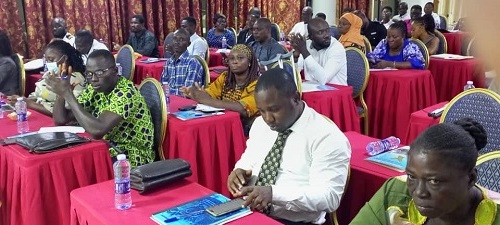
The Environmental Protection Agency (EPA) has reiterated that community mobilisation is key to forestall any future oil spills along Ghana’s coastline.
It stressed that, as Ghana continued to explore hydrocarbons, stakeholders need to build their preparedness and resilience particularly at the local level to deal with oil spill occurrences.
A Principal Programme Officer, EPA, Western Region, Mr Kwadwo Opoku-Mensah said these at a stakeholders’ workshop on the revised Ghana National Oil Spill Contingency Plan (NOSCP) held in Takoradi on Monday.
Organised by Friends of the Nation (FON) in collaboration with Center for Public Interest Law (CEPIL) and Oxfam Ghana with supports from Norwegian Agency for Development Cooperation (NORAD), the workshop reflected on international best practices and also provided views on the NOSCP, which has been in operation since 1986.
The NOSCP brings together the combined resources of the nation and oil, shipping and oil exploration and production companies, to provide level of preparedness to deal with the threat oil spills posed to the environment. It will also allow rapid and cooperative response to oil spills and complement other government and industry contingency plans at port or oil installations.
Mr Opoku-Mensah said “Our door is opened. We will continue to work together and sensitise stakeholders, communities especially our fisher folk and improve upon our strategies and engagements. We’re not saying it would not happen, but, when it does, we should be prepared and that’s why we are reviewing the national contingency plan.”
He continued “We want the right things to be done, reduce or minimise the risks for the next generations to come and benefit.Yes, there will be the need for oil production, but, we need to produce the resources in manner that will not affect other sectors like the fisheries. Economic development should be pursued in a sustainable manner.The question we need to ask is, are we prepared to handle oil spills? Hence the NOSCP.”
Outlining risk assessments which included loss of containment during fuel transfer, pipeline rupture, offloading at sea, subsea leak or well blow out and vessel grounding, he said, the NOSCP also assessed sensitive assets like turtles who laid eggs at estuaries, coastal risks such as sandy beaches, rocky shores at low tide showing algae growth, salt industries, beach seine nets, and fishing landing sites.
Another area the NOSCP considered, Mr Opoku-Mensah mentioned, were the regulatory framework such as the International Convention on Oil Pollution Preparedness Response and Cooperation 1990 (OPPRC Convention), Conventions on Wetlands of International Importance (Ramsar Convention) and the International Convention for Prevention of Pollution from Ship, 1973 (MARPOL).
Others are the Abidjan Convention, EPA ACT 1994, (Act 490), Maritime Pollution Act 2016 (Act 932) and the Petroleum Exploration and Production Act, 2016 (Act 919).
Tier one, he explained, looked at local, port, facility contingency plans using resources necessary to handle a local spill and or provide initial response, hinting that, oil producers had also trained local teams to handle such situations.
FROM CLEMENT ADZEI BOYE, TAKORADI








